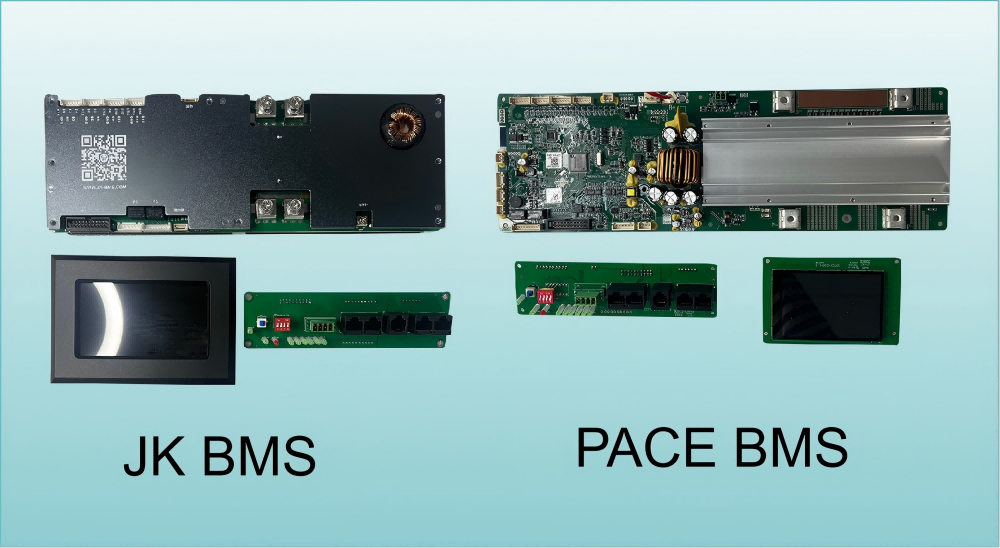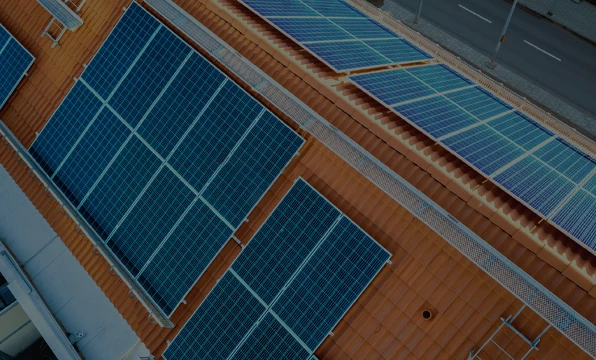When it comes to lithium-ion battery systems, the Battery Management System (BMS) is the brain of the pack. It safeguards performance, ensures safety, and maximizes cycle life. Two of the most popular BMS options on the market are JK BMS and PACE BMS—but they cater to very different needs. Here’s a detailed breakdown of their strengths, weaknesses, and which one might be right for your application.
JK BMS: The Feature-Packed Powerhouse
Strengths:
Massive Active Balancing (2A): JK’s standout feature. Its high-rate active balancing moves energy between cells efficiently, making it ideal for large series-connected packs—even when cells aren’t perfectly matched.
Excellent Value: High functionality at a very competitive price point.
Extreme Configurability: Nearly every threshold, delay, and function can be fine-tuned via its app, making it a favorite among engineers and DIY enthusiasts.
Bluetooth App Included: Built-in connectivity for monitoring and configuration from your phone.
Weaknesses:
Complex Setup: Too many adjustable parameters can overwhelm beginners and increase misconfiguration risks.
Build Quality Variance: Good overall, but less rugged than PACE. External shunt designs need careful installation.
Inflated Current Specs: In practice, derating continuous current claims by ~20% is recommended for thermal safety.
Community-Based Support: Most help comes from forums and YouTube, not the manufacturer.
Massive Active Balancing (2A): JK’s standout feature. Its high-rate active balancing moves energy between cells efficiently, making it ideal for large series-connected packs—even when cells aren’t perfectly matched.
Excellent Value: High functionality at a very competitive price point.
Extreme Configurability: Nearly every threshold, delay, and function can be fine-tuned via its app, making it a favorite among engineers and DIY enthusiasts.
Bluetooth App Included: Built-in connectivity for monitoring and configuration from your phone.
Weaknesses:
Complex Setup: Too many adjustable parameters can overwhelm beginners and increase misconfiguration risks.
Build Quality Variance: Good overall, but less rugged than PACE. External shunt designs need careful installation.
Inflated Current Specs: In practice, derating continuous current claims by ~20% is recommended for thermal safety.
Community-Based Support: Most help comes from forums and YouTube, not the manufacturer.
PACE BMS: The High-Performance Workhorse
Strengths:
Robust & Reliable: Fully potted design resists vibration, dust, and moisture. Current ratings are conservative and realistic.
Simplicity & Safety: Works seamlessly out of the box with minimal setup. Designed with a focus on reliability over feature overload.
High-Current Performance: A proven choice for continuous discharge above 500A without overheating.
Excellent Support: Direct, knowledgeable manufacturer support is a major advantage.
CAN Bus Integration: Professional-grade communication with vehicle ECUs, inverters (e.g., Victron), and other smart systems.
Weaknesses:
Higher Price: A premium product with a premium cost.
Limited Balancing: Relies on passive balancing, suitable only for minor corrections during charging—not for fixing severely unbalanced packs.
No Mobile App: Configuration is handled via Windows PC software only.
Which One Should You Choose?
Robust & Reliable: Fully potted design resists vibration, dust, and moisture. Current ratings are conservative and realistic.
Simplicity & Safety: Works seamlessly out of the box with minimal setup. Designed with a focus on reliability over feature overload.
High-Current Performance: A proven choice for continuous discharge above 500A without overheating.
Excellent Support: Direct, knowledgeable manufacturer support is a major advantage.
CAN Bus Integration: Professional-grade communication with vehicle ECUs, inverters (e.g., Victron), and other smart systems.
Weaknesses:
Higher Price: A premium product with a premium cost.
Limited Balancing: Relies on passive balancing, suitable only for minor corrections during charging—not for fixing severely unbalanced packs.
No Mobile App: Configuration is handled via Windows PC software only.
Which One Should You Choose?
Choose JK BMS if:
You’re budget-conscious.
You’re building a large stationary battery (e.g., solar powerwall).
Your cells need strong active balancing.
You enjoy tinkering, customization, and data logging.
Your continuous current requirements are moderate and within safe derated specs
You’re building a large stationary battery (e.g., solar powerwall).
Your cells need strong active balancing.
You enjoy tinkering, customization, and data logging.
Your continuous current requirements are moderate and within safe derated specs
Choose PACE BMS if:
Safety and reliability are your top priorities (EVs, boats, or primary home backup).
Need sustained high-current performance (500A+).
Want a “set it and forget it” solution.
Require CAN bus integration for professional equipment.
Operate in harsh environments with vibration, moisture, or dust.
Need sustained high-current performance (500A+).
Want a “set it and forget it” solution.
Require CAN bus integration for professional equipment.
Operate in harsh environments with vibration, moisture, or dust.
Final Verdict
There’s no universal “best” BMS—only the best choice for your needs:
JK BMS → Best for DIY solar storage and enthusiasts who need affordable, high-balancing capability.
PACE BMS → Best for professional, safety-critical, or high-performance applications where reliability outweighs cost.
Both have their place in the world of lithium-ion battery systems, and choosing wisely can make all the difference in your project’s performance and longevity.
JK BMS → Best for DIY solar storage and enthusiasts who need affordable, high-balancing capability.
PACE BMS → Best for professional, safety-critical, or high-performance applications where reliability outweighs cost.
Both have their place in the world of lithium-ion battery systems, and choosing wisely can make all the difference in your project’s performance and longevity.
Inquiry more product details from the lithium ion battery supplier:
WhatsApp/Wechat/Mobile: +86 13332949210
Email: info@xihobattery.com
Website: www.xihopower.com
WhatsApp/Wechat/Mobile: +86 13332949210
Email: info@xihobattery.com
Website: www.xihopower.com
 +86 13332949210
+86 13332949210 info@xihobattery.com
info@xihobattery.com







 Xiho
Xiho Sep 05 2025
Sep 05 2025











